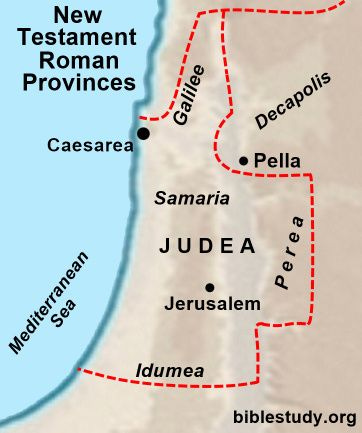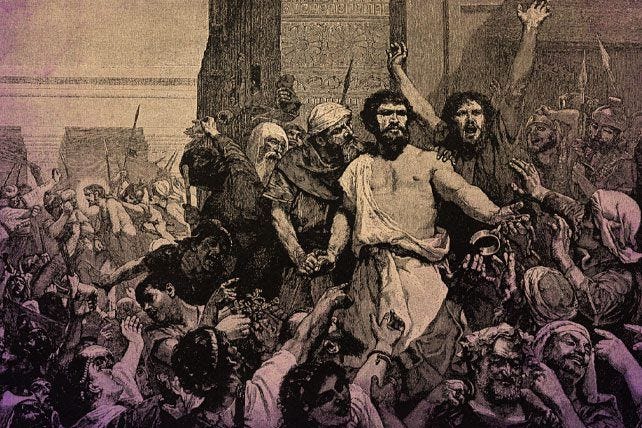
Was Jesus’ Crucifixion a Hoax? – Questioning My Religion [Part 2]
I just needed to know if what I have believed for 40 years of my life is true, so I started digging…
As a Catholic, I was raised to believe everything in the Bible is a true story, so for me, the Bible is history and I never questioned it because questioning is something essentially forbidden in the Catholic faith. Only awful atheists and nonbelievers question and I sure wasn’t either of those things. Then, after 40 years of not questioning, the day came where I was forced to inquire; not being able to make sense of some of what is in the Bible really began bothering me. For example, why did God kill millions of innocent people throughout the Bible? Why is God all-loving and all-forgiving but sends people to burn in hell forever if they believed in the wrong god because their parents taught them the wrong religion? (Read Part 1 of this series for more details on my childhood and what led up to this point in time)
As I began reminiscing over my life, of which religion played a huge role, I began having even more questions and ultimately I began my quest for truth. I simply needed to confirm what I had been taught to be real. Being that I am an investigator, confirming history is right up my alley, and being that Jesus was a real person, I thought to myself, “this will be the quickest research I have ever done!”.
I vowed to myself to treat this investigation no differently than I would any other subject despite my emotional ties to it (and despite if my mother ever finds out she will probably disown me for questioning). With that being said, in this case we must compare what the Bible teaches versus public records, laws of the time, witness statements, maybe I can find books written back then or some form of news publications – the more evidence, the better. Now the question was where to begin?
The premise of Christianity is Jesus’s resurrection. The Bible even says “‘If Christ has not been raised, your faith is in vain’” (1 Cor. 15:17) and the Vatican doubled down, stating the resurrection and ascension of Jesus Christ is the ‘sine qua non’ of Christianity, meaning ‘without which, nothing’ (Catholic Encyclopedia, Farley Ed., Vol., xii, p. 792). As of 2013, 83% of Americans reported sharing my belief that Jesus literally rose from the dead. This figure nearly mirrors the 77% of Americans who reported deeming themselves to be Christian (2009). For those of you who aren’t Christian, let me tell you what the Catholic church taught me since the age of five:
God has a son, Jesus (in my religion these are two separate entities but in some branches of Christianity they are one in the same). Jesus (aka Christ) was born on earth and ultimately was crucified. Three days after death, he rose from the dead and ascended into heaven to be with God forever. This process proved Jesus is the true messiah, the son of God. Because this occurred, our sins have been forgiven by God and we also have the opportunity for eternal salvation which we refer to as Heaven. We can get to Heaven if we accept Jesus as our savior, are true believers, worship Jesus and God, follow the teachings of the Bible, pray, repent for our sins by begging him for forgiveness, and attend church (in some branches of Christianity, it is not a requirement to attend church but in the Catholic faith it is because in this arms of the religion we believe in the Pope and he provides us with “rules” per say. One of those rules is you must attend church and receive the sacraments which are the body and blood of Christ; Eucharist). As you can see, everything in my faith hinges upon Jesus. If Jesus did not die for our sins and be resurrected then the whole premise of Christianity is out the window, right?
So it seems, all I needed to do is prove the resurrection was real and my work here is done. Perhaps then my mind will stop questioning, I can be at ease and go back to enjoying the Christian paraphernalia in my house…
Before Jesus was resurrected, he was put to death by Crucifixion. Therefore, in order to prove the resurrection is real, we have to first look at what happened right before that. Let’s start by reviewing what the Bible teaches us about the leadup to Crucifixion: (I can’t possibly link every single source in the text so please see the massive list of Sources as the bottom of this page for more on each topic)
Remember, back in Jesus’ time (6-4 BC through 30-33 AD), Rome had control over Judea.
This means, although the citizens were Jews, the government was Roman, but other than military and public officials, this wasn’t a place where Romans lived.
At the time there was ongoing friction between the Roman government and the Jews for assorted reasons. The Roman government had outlawed secret societies in Judea (yes, even back then they were a problem!), there was beef over taxes, Pontius Pilate was the Roman governor of Judea and he had tendency to do the opposite of whatever the Jews wanted, not to mention the Romans believed in Mythology whereas the Jews practiced Judaism – it’s safe to say there was a lot of tension. Now that the scene is set:
WHAT THE BIBLE SAYS: As the popularity of Jesus grew, the chief priests and scribes “feared him, because all the people was astonished at his doctrine” (Mark 11:18). The Gospel of John clarifies that the Jewish leaders feared Jesus’s increasing popularity not simply because they rejected his teachings, but because they also viewed him as a serious political threat. Because Jesus was such a problem, the Jewish chief priests and Pharisees (Jewish religious-political group) convened to decide what to do about it. During this meeting they discussed the political danger Jesus posed to the Jewish people, saying, “If we let him thus alone, all men will believe on him: and the Romans shall come and take away both our place and nation” (John 11:48). They determined, in order to secure their positions and the political stability of their nation, Jesus had to die (John 11:49–53).
INITIAL THOUGHTS: We are off to a good start because this means there should be an abundance of evidence because Jesus was so popular that the entire nation of Jews was terrified, right there on their home turf – so much so that they saw the only solution being having him killed! I should be able to locate stories about citizens meeting Jesus or seeing his miracles as well as documentation from the Jewish end of things exclaiming how dangerous this man was. The Jew’s fear was common knowledge being that multiple Bible authors were aware of it. I should also find government documentation of some form because, not only was Jesus performing miracles to feed cities worth of people and raising the dead, but in the Gospel of John (John 4:46-54), Jesus healed the dying son of a royal official. This would absolutely be logged in history, especially considering there were historians of the era that were actively logging way less significant goings-ons.
RESEARCH: Wellllllll… as crazy as this may sound, and it will indeed sound crazy if you’re like me and have been a devoted Christian your entire life, there is literally no documentation anywhere of Jesus, his miracles, his beef with the Jews or anything at all, until many years after his death. And when I say “many years”, I mean it. The Gospels weren’t written for multiple decades and aside from those, there wasn’t a peep about Jesus Christ for another century! We will dive into this in more detail later in this series.
I have to admit, I absolutely wasn’t expecting this. And since someone is going to say “there’s tons of evidence!”: if you actually look at what they are claiming to be evidence, it all falls into the category of being created long after the events or, unfortunately, it has since been proven to be counterfeit (either edited, forged or written at a later time and backdated to make it falsely appear to be timely). Whichever way you look at it, there just are not records of this individual which the Jews trembled in fear of until long after he died. And, if you take the time to really dig into what historians are using as evidence, you discover it is the Bible, so you are sent in circles, all of which end up at the same source. As a researcher, you cannot use a single source to confirm the same single source. That would be like a police officer confirming a witness statement by rereading the same statement.
I should also mention, the Bible tells us of weather events like the sky becoming black for three hours and this phenomenon being seen across the world (Matthew 27:45, Mark 15:33, Luke 23:44) , however, there is no record of this occurring and in this case there were men who logged the weather of the times and even they do not mention this historic event. There was no solar eclipse that aligns with this Bible event so that can be ruled out as a possibility for the sky darkening.
I am completely shocked – damn near dumbfounded. How is this possible? How can we justify it? I wanted to know how others explain this and what I discovered is “Jesus wasn’t popular enough to write about” – ok, but this conflicts with him being a super powerful man who had the Jews shaking in their boots sandals. I don’t think we can have it both ways here, either he was so unstoppable that the only solution was to kill him or he wasn’t popular enough to get a mention in history. I don’t know which is correct, but let’s keep digging and see what else we can find…
My next discovery was, although I was raised to believe there was one “Jesus”, it turns out, Jesus was a common name, so saying “Jesus of Nazareth” is like us saying “John from San Francisco”. In fact, it was such a common name that there were numerous other Jesus’s that were documented, one of which was Jesus Son of Ananias – and this might blow your mind because it sure blew mine…
Long story short, Jesus Son of Ananias was a farmer, who, according to Flavius Josephus‘ book The Wars of the Jews, went around Jerusalem prophesying the city’s destruction. The Jewish leaders of Jerusalem turned him over to the Romans who then tortured him. – As you can see, this story is interestingly similar to Jesus in the Bible and historians are forced to agree on this point. In fact, being that there were many people named Jesus, it can be difficult to tell which Jesus is being written about, especially when they share similar stories, therefore historians can’t even agree on which Jesus a story is referring to!
Regarding our Jesus, I then learned, at the time these events are said to have occurred, Nazareth did not exist yet. Perhaps there was a farm or property with that name, but there is no documented city called Nazareth on maps of the time. Outside of the Bible, Nazareth began appearing on maps in the 2nd or 3rd century, hundreds of years after these events took place. So as of right now, in the research, we have a super famous man with a common name coming from a city which did not exist yet and no corroborating evidence, but that does not mean this didn’t happen, it just means I cannot confirm it did… yet…
Let’s go back to the Bible:
THE BIBLE: So the Jews plotted to kill Jesus and he knew it was coming. What happened next was Judas was paid 30 pieces of silver to bring authorities to where Jesus was so they could arrest him. (In Hebrew culture, thirty pieces of silver was a significant number. It was the price paid to the master of a slave if his slave was killed by an ox).
Next, Jewish authorities, which included judges and council members, arrived at night and, under the cover of darkness, took Jesus into their custody.
RESEARCH: Here we run into more issues. This story is problematic because the laws of the time clearly stated:
- No arrest can be made by religious authorities that involved bribery. Judas being paid would have been considered a bribe because without pay he would not have provided the location of Jesus.
- Judges and council members cannot participate in an arrest (to ensure they remain neutral)
Now we can justify this by saying, “They just wanted Jesus dead so bad that they were all willing to break the law, even the judges!” then we can add in “Judges can be corrupt too, ya know?” – and while this is absolutely a possibility, why would the judges need to break the law when they are the ones judging the case? Why risk it? Why not let the normal arrest take place then find Jesus guilty at trial?
THE BIBLE: So now Jesus is arrested (at night, by Judges and council members). What happens next? Three conflicting accounts of events: Bible authors Matthew and Mark vs Luke vs John. Let’s compare:
MATTHEW AND MARK: Jesus was then brought before a Jewish council (Sanhedrin) of the chief priests and elders who sought false witnesses to justify putting him to death (Matthew 26:59). The witnesses all had conflicting stories. Jesus was then accused of threatening to destroy the temple and rebuild it in three days (26:60–61). When the Jewish high priest asked Jesus if he claimed to be the Son of God, he answered: “Thou has said: nevertheless I say unto you, Hereafter shall ye see the Son of man sitting on the right hand of power, and coming in the clouds of heaven” (26:64). That response was deemed “blasphemy” and the council voted Jesus must be executed. They then beat the hell out of him beat him mercilessly. When the beatings ended they sent Jesus to Pontius Pilate who was a Roman governor of Judea (remember, Rome had conquered this area so now the government was Roman but the people were Jews).
The Gospel of Mark generally matches what is stated in Matthew.
LUKE: In his part of the Bible, Luke states that instead of being taken directly to the Jewish judiciary council, Jesus was first taken to the house of the high priest, where he was mocked and beaten (Luke 22:54, 63–65). Jesus spent the night there. The following morning the Jewish chief priests, elders, and scribes convened a council to decide his fate (22:66). Unlike the accounts given in Matthew and Mark, Luke omits any mention of false witnesses or beatings during the council. Instead the council first asked if Jesus was the Messiah (22:67). Jesus refused to answer the question so the council asked if he claimed to be the Son of God (22:67–70). Although Jesus did not explicitly confirm or deny being God’s Son, his lack of a denial and his general unwillingness to cooperate were used by the council to justify his execution (22:70–71). – Quite a different timeline, eh? Then we get to John’s account of events…
JOHN: According to John, after Jesus was arrested he was led to the house of Annas. Annas was a man who had served as Jewish high priest and was the father-in-law of the current high priest, Caiaphas (John 18:13). While it is not clear who attended this meeting, it does not appear to have been a formal trial, since the current high priest was not present and no chief priests or elders are mentioned. However, it does not appear to have been a private conversation since others, including a couple disciples of Christ, were allowed to enter Annas’s court while Jesus was being questioned (18:15–16). The interrogation appears to have been brief; Annas asked Jesus about his disciples and his teachings. In this timeline, Jesus was again uncooperative and responded by telling Annas to ask his disciples about his teachings since he always taught them publicly (18:20–21). Jesus was then bound and sent to Caiaphas, who then sent him to the Roman governor, Pilate (18:24, 28).
RESEARCH: There are some problems with these accounts, above and beyond them not matching. The first problem is that these scenarios are all illegal and violate a plethora of laws.
Law: Charges can not be brought by judges, judges can only investigate charges brought to them.
Law: No trials were allowed to take place at night (after sunset) and no trials were to be held before morning sacrifice.
Law: No secret trials, all trials must be public.
Law: Trials could only be conducted in the Hall of Judgement.
Law: Two to three witnesses were required and their testimony must agree in every detail. When the witnesses testified and did not agree, Jesus should have been released immediately.
Law: A person cannot be condemned solely on the basis of his own words. In this case, this is all they had left because the witnesses didn’t agree.
Law: Charges of Blasphemy are only valid if the name of God (Yahweh) itself was pronounced.
Law: In cases of capital punishment, the trial and verdict must be separated by at least 24 hours. This was to allow more time for evidence to arrive which could favor the accused.
Law: The sentence can only be pronounced three days after the guilty verdict. This means there was to be 24 hours between the accusation and the verdict (with the trial only occurring during the day) followed by an additional three days.
Law: Voting for the death penalty had to be done by individual count, beginning with the youngest so the youngest could not be influenced by the elders. In the bible they all voted for death at the same time.
Law: The unanimous decision for guilt shows innocence since it is deemed impossible for 23 – 71 men to agree without plotting (71 was the total amount of men in the council. The minimum allowable was 23. It is unknown exactly how many were present but Matthew 14:64 states they all agreed unanimously.
Law: All may argue in favor of an acquittal but all may not argue in favor of a conviction (to prevent collusion).
Law: Judges were to be humane and kind. Matthew 14:65 informs us that the Jewish judges spit on Jesus, covered his face and assaulted him.
Law: It is illegal to beat or harm a person sentenced to death
Again, we have to create a scenario which all of the men involved, 100% of them, would choose to violate every law and risk getting themselves in a position which would leave them unable to rule over Jesus during trial, all so Jesus could be sentenced to death because they feared him politically and didn’t like his teachings (at this point, wouldn’t it have been easier for them to simply hire a hitman? Where’s Hilary Clinton when you need her?)
Regardless of which story you pick, the end result was the Jewish leaders delivering Jesus to Pilate, in hopes that the Roman governor would decide to carry out the death sentence they desired.
RESEARCH: Even this minor detail has an issue which is that the Jewish leaders did not posses authority to sentence anyone to death. In fact, the council (Sanhedrin) could not even gather without Roman approval. But let’s say the bottom line is the Jews ordered the death of Jesus and delivered him to Pilate. That means, as of this point in the story, Jesus is in the custody of the Roman government, and here is where we reach a massive problem, perhaps one of the biggest issues of all…
BARABBAS
Even if you want to ignore 100% of the aforementioned, and even if you want to say “there’s plenty of evidence! Nazareth was real it just wasn’t on maps, the Gospels are different because they were written so many years later in time that memory was foggy, it’s normal to wait 100 years to write about someone, and the Jews were so bad they did indeed break every law to make sure Jesus was killed” – even if you can get past all of that – the story with Barabbas goes as follows:
To celebrate Passover, the townspeople would gather and Pontius Pilate would have two prisoners brought out. The people would decide by majority vote (cheering) which of them should be freed and which should be killed.
Barabbas, whose name was also Jesus (see, I told you it was a common name), was a fellow prisoner in custody of the Roman government. Barabbas was imprisoned because he was a horrific murderer, also called an insurrectionist by scholars – and this is who was selected to compete for release alongside Jesus. Both men were brought before the onlookers which consisted of the “crowd”, “the Jews” and “the multitude”. The people cheered for Jesus to be executed and the Jews took it a step further by yelling “Let his blood be upon us and upon our children.”. According to the story, Pilate didn’t want to crucify Jesus but had no choice because it’s who the crowd chose, so he reluctantly agreed to have Jesus murdered and Barabbas freed.
Gosh, where to begin with this one. The first major problem with this story is that no such custom existed. Roman government never celebrated Jewish Passover by releasing a prisoner of the crowds choosing and why would they? Why would any government do this? And let’s say they did, why would they give the crowd a choice between Jesus and a notorious murderer who is an enemy of the State? Why not pick two low-level criminals? And if Jesus was famous both politically and for his teachings, why did the crowd vote to free Barabbas over him? Additionally, the ruler, in this case Pilate, would never have bent a knee to the crowd, let alone the Jews because, as mentioned previously, he was known to intentionally do the opposite of whatever the Jews wanted. Meanwhile, nobody would ever ask for a curse upon their children, especially at a time when mythology and mysticism were in full stride and people truly believed in curses and prophesies. On top of that, the language of Judea was Aramaic but Pontius Pilate spoke Greek. The only people in Judea who spoke Greek were Jewish elites and whomever came over with the Romans after they took over Judea. Being Roman, it is unlikely any of these citizens would be celebrating Passover therefore would not have been at this event.
Remember how I said at the beginning of this section that Barabbas was also named Jesus? We must then ask, “why then do we call him Barabbas in the Bible?”. It turns out the name Barabbas means “Son of the Father”, which, now that you think about it, is quite odd; two men named Jesus, one renamed Barabbas to make the story easier to understand, and the name Barabbas means Son of the Father while Jesus himself is the Son of the Father? This means there were two men with the same identifiers brought up to be decided between. One of those men was without sin and the other was loaded with sin, yet it is the one filled with evil that the crowd chose. To top it off, there is no evidence of this horrific criminal existing outside of the Bible.
This story with Barabbas has been so thoroughly debunked that even biblical scholars now choose to avoid it or dance around it in their writeups on the history of Jesus. They skip from Jesus being incarcerated to Pilate ordering his crucifixion! For me, this presents a major problem because this scenario with Barabbas, the crowd, and the Jews is what resulted in Pilate ordering the execution of Jesus – it is the entire reason Jesus ended up dying on the cross! I cannot count how many times I watched my priest preach about this story during mass as true history, not as a fictitious story. If you are Catholic you will hear this story in full, numerous times as Easter approaches as well as additional times throughout the year. But now that we know it is complete fiction, if we eliminate this part of the story, then what we are left with is Pilate ordering the execution of a prisoner simply because the mob told him to – but real history shows the exact opposite about Pilate. Factually, this man was not the type that could be pushed around (which is why it would make sense to make him governor of Jewish Judea – a position that could not be held by a weak man). This brings us to the second half of this article…
![Did the Resurrection Actually Happen? Questioning My Religion [Part 3]](https://christian.expert/wp-content/uploads/2025/11/did-the-resurrection-actually-happen-questioning.jpeg)
After 40 years of being a devout Catholic, I began having questions – questions which nobody seemed to be able to answer, so I wrote Part 1 of this series Questioning My Religion, it was surprisingly well received. Part 1 ended with me deciding I wanted to learn about my religion, specifically, where did it come from? I am not referring to what the Bi…
![Questioning My Religion [Part 1]](https://christian.expert/wp-content/uploads/2025/11/questioning-my-religion-part-1.jpeg)
SOURCES, NOTES & OTHER STUFF
https://rsc.byu.edu/new-testament-history-culture-society/judea-roman-province-ad-6-66
https://archive.org/details/deconstructingje0000pric/page/20/mode/2up
https://archive.org/details/NailedTenChristianMythsThatShowJesusNeverExistedAtAllPages3246/page/n19/mode/2up
https://archive.org/details/jesushoax0000grah/page/80/mode/2up
https://www.goodreads.com/topic/group_folder/266160
https://archive.org/details/youtube-se3Z_PaOVk4
https://earlywritings.com/forum/viewtopic.php?t=8093
https://en.wikipedia.org/wiki/Paul_the_Apostle
https://www.bibleodyssey.org/articles/violence-in-the-new-testament/
https://archive.org/details/the-criminal-history-of-christianity-vol.-1-the-early-days-berserker-books/page/n5/mode/2up
78% Sayings Of Jesus Are Not Words Of Jesus At All ( Bible Scholars Conclude) Dr. Bart D Ehrman(phd): https://archive.org/details/78-sayings-of-jesus-are-not-words-of-jesus-at-all-bible-scholars-conclude-dr.-bart-d-ehrmanphd
https://www.vox.com/world/2018/6/19/17469176/roman-empire-maps-history-explained
https://archive.org/details/Ehrman-Evans-Debate
https://archive.org/details/TheMythmaker
https://archive.org/details/jesuspuzzledidch0000dohe
https://archive.org/details/NailedTenChristianMythsThatShowJesusNeverExistedAtAllPages3246/page/n19/mode/2up?view=theater
https://gregstier.org/the-unimaginable-suffering-of-jesus/
https://www.gotquestions.org/Moses-promised-land.html
https://archive.org/details/solomons-temple-930
https://archive.org/details/TheTruthAboutJesusChrist
https://www.vatican.va/roman_curia/congregations/cfaith/cti_documents/rc_con_cfaith_doc_20070419_un-baptised-infants_en.html
https://www.bing.com/ck/a?!&&p=90615c9d31cc8acccc8a61e57819c6f7649767910456c6a87aaaf07d69e4d017JmltdHM9MTc0MzU1MjAwMA&ptn=3&ver=2&hsh=4&fclid=1e19a44e-7a53-6a20-061f-b14e7b796bff&u=a1L3ZpZGVvcy9yaXZlcnZpZXcvcmVsYXRlZHZpZGVvP3E9d2h5K3dhcytnb2QrbWFkK2F0K21vc2VzJm1pZD05MUU1NjBCMjdENDk5QzEzODRBMzkxRTU2MEIyN0Q0OTlDMTM4NEEzJkZPUk09VklSRQ&ntb=1
https://ffrf.org
http://www.recoveringfromreligion.org
https://www.daretodoubt.org/resources
http://skepticsannotatedbible.com/lev/10.html#1
https://www.theguardian.com/world/2015/nov/04/vatileaks-scandal-catholic-church-pope-francis
**https://valerietarico.com/2014/08/28/jesus-myth-or-history/
https://polarisfinancialplanning.com/the-phil-ferguson-show-podcast/2017/04/11/208-david-fitzgerald-jesus-mything-in-action
https://www.bible.com/bible/114/MAT.5.NKJV
https://www.goodreads.com/topic/show/2245648-extensive-biblical-revisions-made-by-the-romans
https://www.goodreads.com/topic/group_folder/266160
https://www.bitchute.com/video/qx_Ia9S1NR0
https://www.bitchute.com/video/QeXdgw11rw04
https://www.bitchute.com/video/YEajiurqe9l0
https://www.openbible.info/topics/spells
https://archive.org/details/jesushoax0000grah
https://en.wikipedia.org/wiki/Apostles_in_the_New_Testament
https://www.khanacademy.org/humanities/world-history/ancient-medieval/christianity/a/roman-culture#:~:text=Beginnings%20of%20Christianity,promised%20personal%20salvation%20after%20death.
https://archive.org/details/jesus-a-jewish-prophecy-hoax
https://www.bitchute.com/search?query=Dr+Bart+Ehrman&kind=video&sensitivity_id=normal&duration=all&sort=new
https://archive.org/details/jesus-a-jewish-prophecy-hoax



